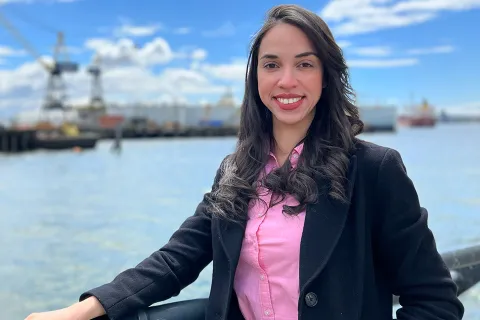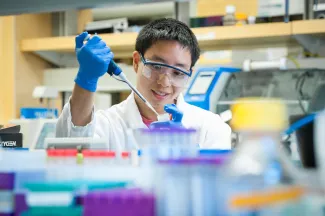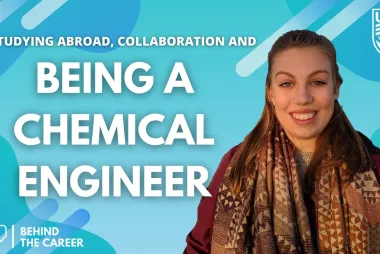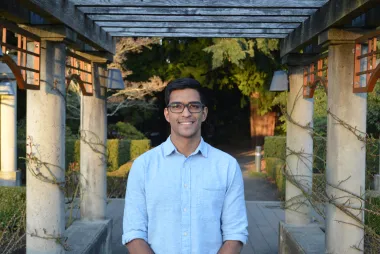"The engineering journey is like a puzzle, it starts off chaotic and senseless, but with every experience and lesson learned, more pieces fall into place and eventually you will see the bigger picture. Be patient, it all comes together in the end."

Paloma Chagas Guerra Pereira
- Degree:
- Bachelor of Applied Science
- Grad year: 2022
- Program:
- Campus: Vancouver
From the Amazon rainforests to the statue of Christ the Redeemer, Brazil is home to many wonders, and it was also mine for the first two decades of my life. Born and raised in Rio de Janeiro, I enjoyed math and sciences from a young age, so, becoming an engineer was not really a difficult choice to make. However, leaving behind all my family and friends to become one was. After extensive research and careful consideration, I made the wise choice to pursue a degree in chemical engineering at UBC followed by what seemed to be the unwise choice of rescuing a stray Brazilian kitten, three weeks before my flight. While I may have struggled with the first of those decisions many times over the years, upon reflection I can gladly say I wouldn’t change either for the world.
I started my journey in Canada by nervously spelling my name wrong and being turned away at the door of the Engineering Student Services to working alongside some of the brightest minds in the mining industry at a global engineering company. Along the way, besides mastering the spelling of my own name, I became fluent in my fourth language, English, and earned a place among UBC’s Chemical Engineering students. While at UBC, I earned awards for engineering innovation and academic excellence, joined the co-op program where I discovered a passion for the mining industry, and finally graduated with academic distinction and a career in Operations Optimization at Ausenco Engineering.
While I have achieved much in the last few years, the truth is that more often than not, the path toward our dreams is not straightforward or easy. However, what I have learned is that resilience will get you there. Your journey might not be as fast as you wish or go exactly as planned, but eventually, the hard work will pay off. After many sleepless nights studying for exams and more hours than I would like to admit questioning my capabilities, seven long years after leaving Brazil, I can say with confidence that I am happier than I ever imagined I would be. All of this was only possible because despite every challenge both internal and external, resilience prevailed.
Why did you choose to go into your field of study at UBC?
I have seen the wonders of engineering from a young age because the greatest engineer that I know just happens to be my dad. I was introduced early on to the complex world of large processes that incorporate and combine every aspect of technology and engineering. From this and my natural aptitude towards math, chemistry, and physics, I knew that chemical engineering was right for me, despite my mother’s insistence that she couldn’t accept another engineer in the family.
As to the question of “Why did I choose engineering at UBC?” Unfortunately, I don’t have a story of discovering the beauty of engineering and chemistry throughout first year like many of my classmates who came straight out of Canadian high schools. I chose to be a chemical engineer first and then evaluated my options. From early on, I have had an engineer’s mindset and just as much as the design of a reactor or the moment around a fulcrum, this decision was calculated. I was in search of a well-respected university, that would give me a globally recognized qualification, and provide me a chance to work and learn alongside world-class experts in my field. I also wanted a university where I could study in a safe country while not getting buried in metres of snow every year. Assessing this criteria, UBC was the optimum choice to become a chemical engineer as it met and exceeded every criteria.
Tell us about your experience in your program. What have you learned that is most valuable?
What UBC Engineering provides is opportunities. Opportunities to learn from top-quality instructors, opportunities to foster innovation and growth, and opportunities to build yourself into a world-class engineer. How each of us capitalize on those opportunities is what defines the value we take away and what our future holds.
Throughout these years, UBC has helped me acquire countless technical theories, a dizzying array of formulae, and many critical skills for life as an engineer. However, the most valuable thing that I learned along the way is resilience. Every course throughout the engineering program places tools in your toolbox, but if you wish to achieve your goals, the most important tool you can equip yourself with is resilience. This is the backbone of everything that I have accomplished, and I am grateful that I developed this early in my career. With this mindset, I am able to face every challenge with the confidence that I will be able to either apply one of the tools I have collected in the past or find the new one that I need to succeed. Now that I have learned the core skills required in my profession and reinforced them on a foundation of resilience, I look forward to continued growth and development from whatever the future may hold for me.
How are you applying the skills you learned through your studies at UBC?
The skills that I have acquired while at UBC have helped me earn a position with Ausenco Engineering, a global engineering consulting company that is well established in the resource industry. I have worked with Ausenco’s Global Operations Optimization team for over a year on solving complex processing challenges in mining operations. While in this position, I have developed skills in process modelling and analysis through consulting projects with active operations on six out of seven continents around the world.
As a Process Engineer, I will be working to expand our capabilities through innovation and technology development with a focus on next generation process modelling and machine learning analytics. I look forward to continuing to challenge the status-quo while building my skills and helping Ausenco find a better way to meet the needs of a shifting global demand while pushing the industry towards sustainable operating practices.
Where do you find your inspiration for using your degree to make an impact on our world?
As Sir Isaac Newton once wrote, “If I have seen further, it is by standing on the shoulders of giants.” Everything I have, I owe directly to the love and support of my family, without whom I wouldn’t have a first-rate education or a job with a globally recognized engineering company. For seven years, my parents, along with my aunts and grandmother, sacrificed everything to help me achieve this dream. Even though this meant that I would not be able to see them for seven years, they never gave up on me or stopped supporting me through every twist and turn. These people are the giants that helped raise me to great heights and their sacrifice motivates me every day to work hard and put my education to good use in making the world a better place.
Because of everything that my family and I have put into gaining me these skills and establishing me as an engineer, I have a very action-oriented and results driven mentality. This constantly drives me to solve new challenges and confront the way things have always been done. I find it greatly rewarding to see the positive changes that my work has contributed to, and I will continuously strive to responsibly apply my skills for the benefit of society.
I aim to use the skills that I have developed in process modelling and machine learning to tackle the largest challenges in the continued modernization of the mining industry.
What are some contributions you would like to make when it comes to the future of work in your field?
Mining is one of the oldest and largest industries in the world and these factors also make it one of the most resistant to change. Resource extraction has a well-earned reputation for being a dirty industry with a strongly negative social perception. However, the shift from fossil fuels to low-carbon technologies is predicted to be highly mineral intensive and greatly impact the demand for critical minerals. For this reason, a stable metal supply chain is vital for continued progress towards a decarbonized future. I aim to use the skills that I have developed in process modelling and machine learning to tackle the largest challenges in the continued modernization of the mining industry.
I plan to continue my work in optimization for mineral processing around the world with the aim of improving overall societal value while reducing impact on the natural environment. As a process engineer, I am trained to avoid narrowly focusing on a single aspect, but rather look at all of the individual parts as contributing to a whole picture. Engineers trained with this mindset are essential to the growth and development of the mining industry as a holistic approach is required to move toward more sustainable and responsible mining practices. It is essential to future of the industry that mining practices consider community engagement, environmental sustainability, and responsible land use to provide the greatest societal value with minimum harm. To this end I aim to reshape the way that we approach problems and shift the focus on how we consider these aspects in our value definition.




